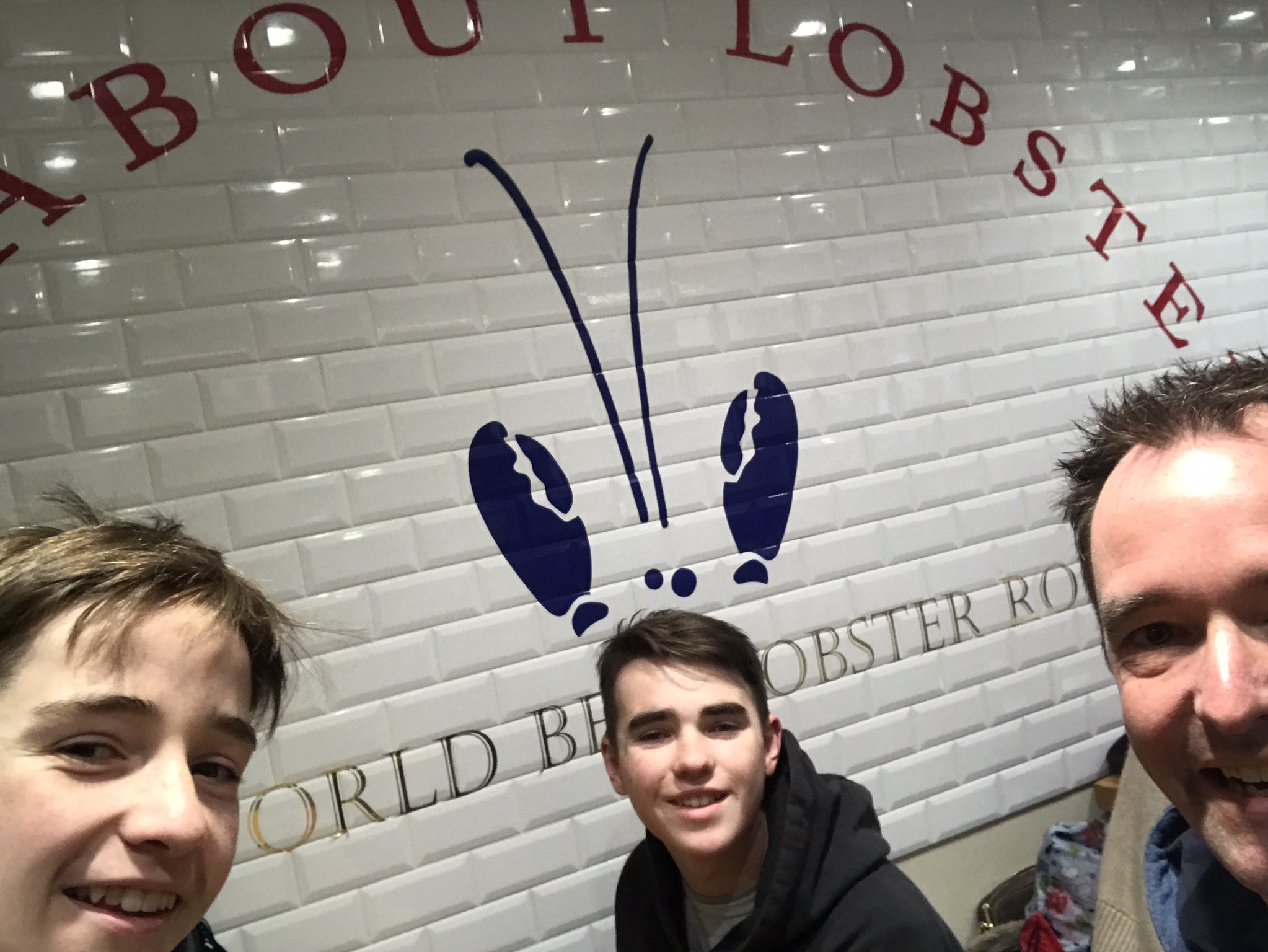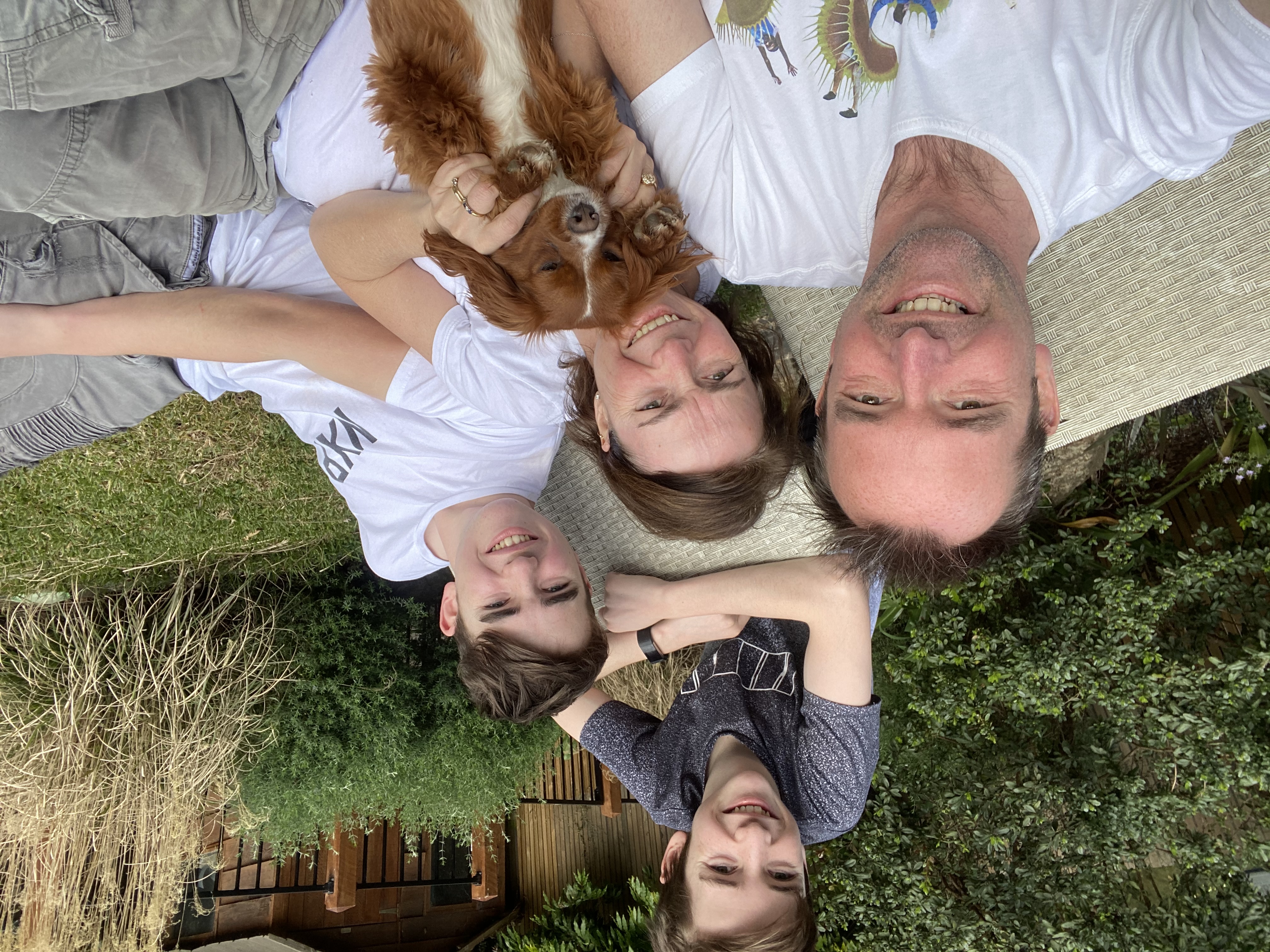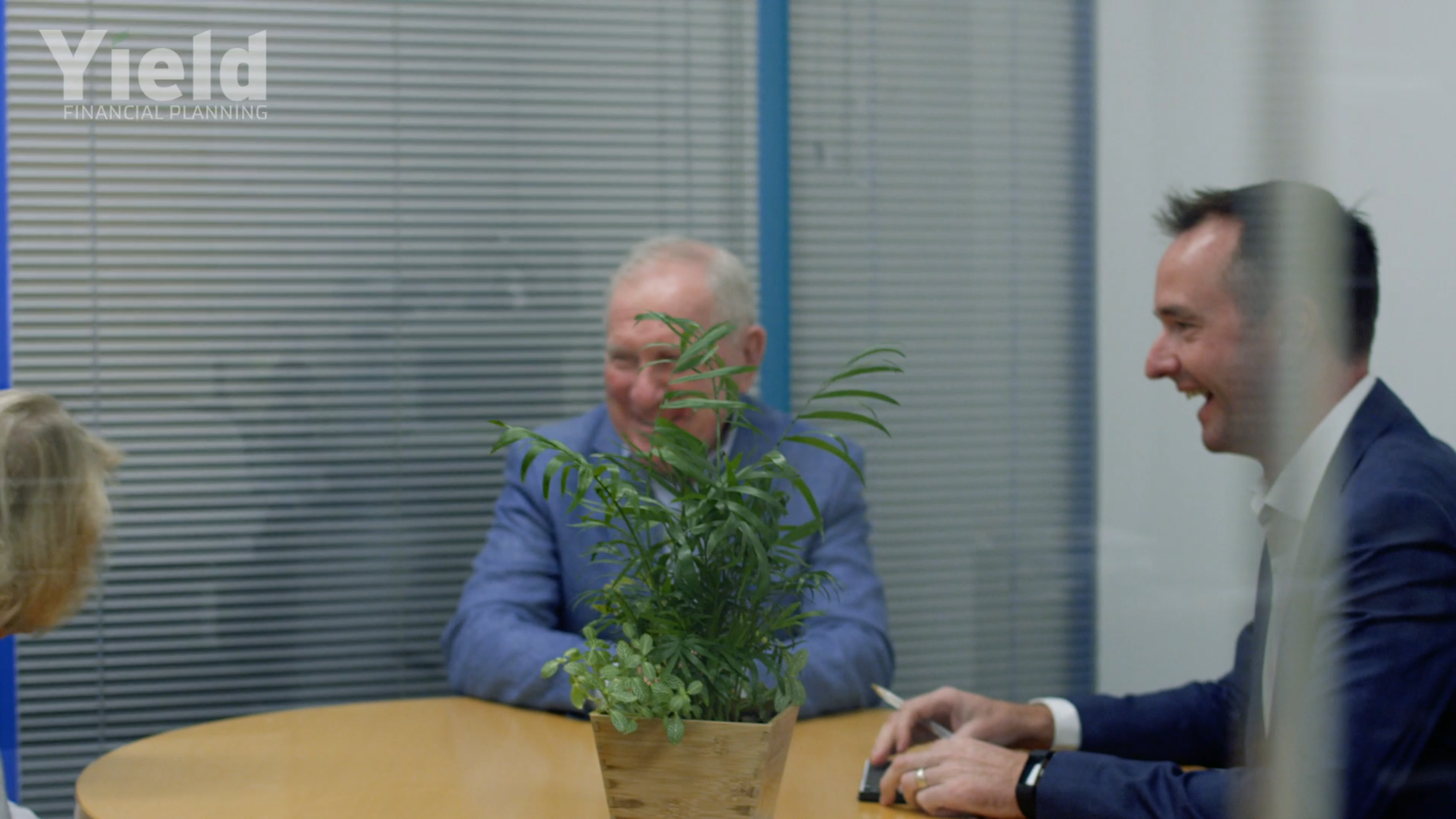Meet James: An adventurous adviser with Packer-sized lessons to share
As the Kenny Rogers song goes, "You've got to know when to hold 'em and when to fold 'em." For James McFall of Yield Financial Planning, that very line is what's keeping him up at night. Apart from raising a young family and running a burgeoning business, the market volatility of late has kept James both in check and wide awake.
James' approach is simple - a desire to learn, love, and share a helping hand with those who need it. He also loves looking out for the next great adventure with his two teenage boys.

His greatest ambition is simple - to create a business with the power to carry on long after he decides it's time to hang up his hat.
"I definitely don't feel like the job is done," James says. "It's not quite my time to be sitting back, drinking brandy and reminiscing about how great it's been!"
Giving back is also one of James' passions - but as you'll learn in our interview, giving back also presents an "exponential" growth opportunity to help more Australians invest more responsibly.
In this Meet the Adviser profile, you'll learn more about James' life as an adviser and in particular, his love of property. In turn, we'll take a look at the benefits of specialisation in an asset class as a background for investing. Plus, we'll also chat about two of his favourite funds for clients.
Financial adviser profile
- Name: James McFall
- Age: 48
- Current firm: Yield Financial Planning
- Years working as an adviser: 22
- Investment goals: To be honest, my investment goalposts move around. I am someone who is very happy in a tent or a caravan somewhere and can happily spend months off the grid, but I also enjoy some of the finer things in life that only money can buy. With this in mind, I invest for choice and structure our finances to give flexibility in the short and medium term, with the rest parked for the long term and whatever comes with it. I also don’t value more than we need for the sake of it and envisage giving back increasingly where we can.
- Products used: Perpetual Pure Micro Fund, AB Managed Volatility Fund, Allan Gray Australia Equity Fund
- Biggest portfolio holding: Investment property
Why did you choose this profession and how did you get started as a financial adviser?
When I was 18, my dad gave me some Coles Myer (ASX: COL) shares and explained why they should be a good investment. An iconic Australian brand, they had good dividends and growth prospects. I watched them with interest, making my first investment a few years later in the Crown Resorts (ASX: CWN) float. I remember thinking that the house never loses. Unfortunately for me, it did the first time around, but my interest grew.
While my parents introduced me to investing, they also had a scarcity mindset about money. This taught me good principles, like saving, but it also meant that many things were a trade-off in our house. I became aware of financial planning in 2000, when I was working in customer service. I knew I liked helping people and when I started researching financial planning it ticked a lot of boxes for me.
I started studying for a Diploma of Financial Advising and after only a few subjects, I knew I had found a career I could love and make a positive impact in.
To get my foot in the door, I sent a letter out with my resume to over 80 firms. I received five interviews and was given my start as a paraplanner at an accounting and financial planning firm in Sydney.
What do you believe makes you different to other advisers in the industry?
At a business level, Yield caters to a range of advice needs and as we grow and attract new experience to the team, we are increasingly specialising. We have specialist advisors that focus on wealth accumulation, retirement planning, risk insurance, debt advice and aged care planning.
Specialisation becomes a differentiator because it allows us to go deeper into each individual, their needs, and it also positions us well to adapt to our clients' changing advice needs over time. Personally, I specialise with High Net Worth clients and more complex needs, such as SMSF, tax structuring and more bespoke investing. 40% of my largest 40 clients are self-employed.
Apart from this, an area of advice we are uniquely positioned to advise on is property and 45% of our client’s own investment properties.
Prior to starting Yield in 2013, I was the owner of a property-focused financial planning firm and this expertise has carried over to Yield. We helped property investors develop plans that go deep into the cash flow and capital impacts of property purchases and sales and help inform their property plans considerate of aspects like tax, debt, liquidity, risk profile, performance, diversification and more.

Can you share a bit about your process for building portfolios and selecting investment products?
- ‘Unconstrained’, meaning our investment committee is seeking the best after-cost return.
- ‘Core-satellite’, is a low-cost portfolio with a core of index and satellite of best ideas.
- ‘Ethical overlay’, where investments are selected considerate of ESG.
- ‘Bespoke’ a highly tailored portfolio, considerate of existing investments and is typical for HNW clients with structures, like SMSF.
Our investment committee meets monthly and includes two external asset consultants. Our philosophy is ‘change when change is needed, not change for changes sake’ and we seek to achieve outperformance for clients by making asset allocation tilts and identifying thematic opportunities.
For example, last year, we moved from a long-dated international share overweight compared to Aussie stocks. We are now overweight on Australian equities, which has helped to create alpha. We are not persuaded that passive is better than active or vice versa, instead we believe that each style has its place through different stages of the cycle.
Another point is that we offer a Managed Discretionary Account (MDA) and run this on two separate platforms. We’ve chosen these because they are cost-effective and offer premium functionality for our client experience.
Can you share two of your “go-to” funds with us?
Sticking to Australia, a direct fund that has been excellent for clients since we first invested in 2014 is Perpetual Pure Micro. The returns have been stellar when measured against its peers and benchmark, and the fund is truly set up for success in the way it has been structured, including that it has strict limits on the number of funds it accepts.

A fund we go to tactically in periods of uncertainty like now, is the AB (Alliance Bernstein) managed volatility fund. Its objective is to only take half of a market drawdown and capture at least 80% of the upside. While it is not a fund we hold in every stage of the cycle, it has an excellent record of achieving outperformance when volatility is heightened. Since the fund's inception in 2014, the fund has outperformed during 9 out of 10 of the largest monthly index falls, and in 5 of those, it has been in line with or better than its 50% objective.

How do you discover new managers and investment opportunities in a market saturated with products and issuers? What makes a manager stand out?
As a start, I think you need to be open-minded about it, but you also need to be able to filter the noise quickly too or you will be swamped.
Being clear on our investment approach helps with this, as depending on the stage of the cycle we are in, we will know where we are looking to lighten or gain exposure. This helps us identify the investment forums we go to, the investment managers we meet with and the literature we seek out.
We have managers actively approaching us regularly and they are a great source of information for their house view on the markets they invest in. Most managers will also have a raft of investment options that achieve different outcomes in different markets, so we are always trying to tap into what the managers see as their best opportunity with the current outlook. Business Development Managers are an excellent source of insight in this regard.
The head of research at our licensee is a member of our investment committee at Yield, so we benefit from their research and portfolio decisions, as well as collaborating with peers on funds they like in the current market. We use Mercer research and seek independent research from Zenith and Morningstar wherever possible, which provides deep analysis.
A pitch deck from a fund manager arrives in your inbox, what happens next?
We often get managers sending data and asking for meetings. I will typically park material, to review in a quieter moment.
We won’t take a meeting if we don’t see that there is potential value in it, so if it is not clear at the outset whether we want to pursue it further or not, we may ask for a summary of why they believe the investment is a great solution in the current market.
Sometimes, the response can absolutely pique our interest and make us prioritise the time to review it further. If it passes muster on the first hurdle, it will be added to the investment committee meeting agenda and ultimately need approval from the licensee before we can use it.
How would you describe your personal investment strategy?
Diversified! Share investing is what got me into financial planning and it remains a core part of our portfolio. I invest in direct shares and have long held a love for micro-caps, but I also typically hold what we recommend to clients. I’ve learnt to trust in this, because researching what we recommend to clients is where I spend so much of my time, and it is also where I am the most objective.
Even professional investors can get clouded by emotional decision-making at times and I’ve been burnt more than once by deviating our personal portfolio decision-making away from the strategy we recommend to clients, such as being far too overweight in one asset class or sector. I think these experiences have helped to make me a better advisor in the end too.
We personally use structures for tax planning, like SMSF, bucket companies and trusts and we tailor our strategy to each. Residential property makes up a meaningful part of our long-term portfolio as well.
Could you please share your top three holdings in % terms in your personal portfolio and tell me a bit about why you hold each of these positions?
The property we own is the biggest. Just by virtue of how expensive it is to get into the market and the properties are leveraged with debt that inflates the overall percentage. 45% of our clients have a property in their portfolio and we track the performance of each client's investment property against the monthly median for the area they are invested in at their review. This has highlighted the value of holding well-selected property for the long term when it suits an investor's risk profile, objectives, and investment time horizon.
Outside of property, we hold individual shares and managed funds that range in value. But to look at any of them individually, they are dwarfed by the individual property value. This is because there is negligible risk of an investment property dropping in value to zero, whereas a single company could go bust.
To manage single company risk, we are diversified across several companies and funds. The two biggest individual holdings we have currently are Allan Gray Australia Equity Fund, which has a contrarian investment approach, essentially looking for value that they believe the market is not pricing properly. They are the largest fund manager in South Africa and have been crushing it lately. Especially this year while the market has been volatile, which has been a great buffer for us and our clients.

The second largest is Perpetual Pure Micro Fund. When measured as a whole, shares and managed funds make up approximately 50% of our investments.
Could you tell me about your worst investment? How did you deal with this falling position or fund?
Thinking back on a personal investment I made many years ago, I put money into One. Tel only weeks before they ultimately went under. I got in when James Packer and Lachlan Murdoch announced they were going to back One. Tel, only to reverse this decision when they realised a short time later that the company was irretrievable.
Yet again foiled by the Packers!
One. Tel was a market darling of the time and I have since learned my lesson on high stakes turnarounds like this. When markets sell off a company so severely it is likely with good reason, and I was guilty of a lack of research and understanding of the real issues the company faced.

What conversations are you most frequently having right now with clients? And what is your answer to these questions?
Ultimately, our job is to help our clients stop the leaks, grow wealth and feel secure spending what they have worked hard to accumulate and where necessary to weigh up the compromises of different choices.
Some clients are interested to have more detailed discussions about investment markets and right now there is a lot to talk about inflation, geopolitical issues, corporate profits, economic growth, and rising interest rates. But in reality, we are having similar conversations with these same clients that are interested at all stages of the cycle. We do try and stay ahead of questions about markets, by communicating with clients by email predominantly in periods of uncertainty.
What are the most common mistakes you see in the portfolios that you inherit and how do you go about fixing them?
Single asset risk is a big one. We’ve already spoken about how easy it is to become heavily overweight in property, however you see it with shares too. Typically, it is where people have held a company for many years, possibly added to their position through dividend reinvestment and they are reluctant to sell them for nostalgic reasons like past success or more pragmatic reasons like capital gains tax.
People suffer from confirmation bias too, as once you’ve had success in an asset class, it is easy to double down on that one asset class or investment. Data from the ATO reflects the overweight bias Australians with SMSFs have for Australian shares and in particular the banks.
In the five years to the end of 2021, the Australian All Ordinaries underperformed the international MSCI by a considerable margin, including when you factor in Australia’s higher dividends. This means that investors with largely Australian shares have needed to achieve considerable outperformance above the index, just to be in line with investors in the international index.
There is no one solution for ‘fixing’ this because there can be so many variables from person to person, but broadly our advice will be informed by what the person is trying to achieve, their tax position, their debt position, and what the outlook is for the investment.
If you could change one thing about the industry so that it can better serve Australians, what would that be?
What is needed to make financial advice more accessible to Australians is to strategically reduce red tape. This should start by reinventing the SOA.
When I was at my doctor the other day, their advice was verbal while taking a file note. When I seek advice from a lawyer, they can respond in an email or letter. The true value of financial advice is no different. People are seeking our advice, but instead what they must pay for as well, is an unwieldy compliance document that often takes days if not a week or more to complete. Some people do value this and will pay for all the detail, but like most things in life, there should be more control for the consumer to determine what they see value in.
Now that so much has been done to remove self-interest from advice, like banning investment commissions and volume bonuses, flattening insurance commissions, increasing education standards, introducing best interest duty, and all the changes that came before it, we have an opportunity to transition from an industry to a profession and for me, it feels almost within reach. With the conflicts removed, we now just need an opportunity to prove that we are up to it.
Can you share a personal passion or ambition you have for your future?
I want Yield to grow well beyond me, where our opportunity to make a meaningful difference in people's financial future endures and the team members that share in our vision and growth, also have the opportunity to own part of our story and enjoy the rewards that come with this for the benefit of their family and future.

Personally, I am always looking for the next adventure. Some things I have on my hit list are to raft with my boys through the Grand Canyon for a few weeks. My wife and I want to go to every grand slam (so far only the Australian Open), eat at the top 20 restaurants in the world (a moving target, but we’ve been lucky to get to some so far), get lost for three months island hopping in Indonesia and we plan to own a holiday home in Europe somewhere (probably France), that we can base ourselves in for three months or so of the year.
We’ll see if I live long enough to make all this happen, but we’ll have fun trying regardless.
Are you enjoying Livewire's Meet the Adviser series?
If you enjoyed hearing about James' investing journey, please give this wire a 'like', and if you know someone who might enjoy the article, why not send them the link.
You may enjoy reading more of our Meet the Adviser and Meet the Investor interviews.
We are looking forward to hearing from more financial advisers in 2022. If you are interested in being profiled in our Meet the Adviser series, contact us using the email address below:
content@livewiremarkets.com
2 topics
2 stocks mentioned
3 funds mentioned

